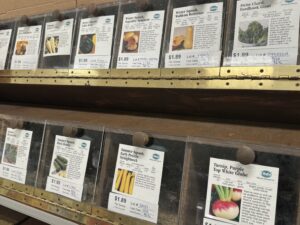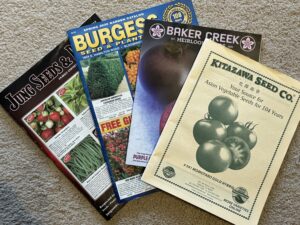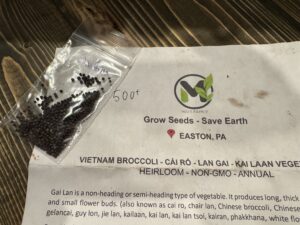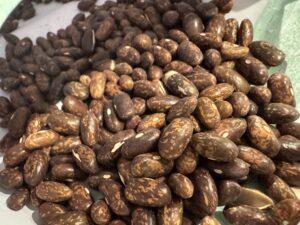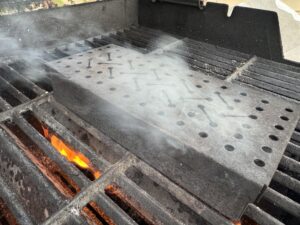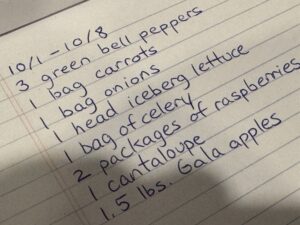Before I address this topic, I want to say something that more first-time gardeners need to hear: The bulk of your first-year garden should come from started plants from a local nursery, or even just one of the big box stores. Concentrate on building your soil health by adding compost as you can, learning how your new plants respond to watering at different frequencies and plant spacing, and recognizing patterns of pests and disease. By eliminating the single greatest point of failure (seed starting) when you’re just starting out, you will become a more capable and confident gardener in the long run.
Shopping for seeds is the harbinger of spring for me, even though the process starts a couple of months before the official first day. Planning what seeds to buy and where to get them from is the most important set of decisions someone with an established garden makes all season.
I don’t buy my seeds from a single source for the simple fact that no one vendor offers everything I want to grow. I also like to spread my business around in all my hobbies. It’s never a good thing when a few companies end up dominating an industry. Quality goes down because companies can afford not to care because of reduced competition. You also start to get less for your money – have you noticed how most seed packets have doubled in price over the past several years, yet they contain half the number of seeds they used to not too long ago?
In this article, we’re going to look at the five primary ways to find the seeds you want for your garden.
Box Stores
Every Home Depot, Lowe’s, and Walmart receives a cardboard merchandising display stocked with seed packets from one of the big players in the industry (Burpee or Bonnie) around the beginning of February in our area. You’re guaranteed to find some standard tomatoes (all-purpose slicers, cherry, beefsteak, and sauce), peppers (bells and a few hot varieties), along with other common vegetables, herbs, and flowers.
The quality of the seeds is fine and it’s great if they have everything you are looking for, but if you’ve seen one of these displays, you’ve seen them all. Our city has a Meijer, Kroger, Walmart, Lowe’s, and Home Depot. There’s about a million square feet of floor space among the five stores, but we’re stuck with the same three varieties of cucumbers. These displays are pay-by-scan, meaning the supplier, and not the retailer, owns the inventory. It’s convenient for the retailer because the product (and any resulting shrink) is not on their books, and this arrangement requires minimal labor for merchandising setup and teardown, but they have to offer whatever the seed purveyor wants them to based on their analytic data for your region.
Independent Nurseries/Small Hardware Stores
These are the sweet spot for me when it comes to buying seeds in person. Independent nurseries and smaller chains are more likely to allocate space for specialty seed companies who can’t compete on volume with the bulk suppliers. I could drive to every Lowe’s and Home Depot in America and not find milkweed seeds, but a small local nursery with a few locations in central Ohio had three different varieties in stock.
Our local Ace Hardware even has bins of bulk seed that you scoop yourself and pay for by weight. They have some you would expect to buy in bulk like sweet corn and peas, but there are also some surprises like daikon radish and celery, which you rarely see offered in anything but a standard packet of seeds. This is far more economical when you’re doing a large plot of the same crop or anticipate ongoing succession plantings throughout the season.
Mail Order Seed Catalogs
As a teacher, I always look forward to what I call my “annual shutdown,” which is the period in between Christmas and the New Year when everything slows down and you lose track of what day it is. It’s also the time when seed catalogs start arriving in the mail. Some of these are so well done that I would say they are more like coffee table books than catalogs. I just love sitting next to my roaring woodstove with a hot beverage when the snow is flying and the wind is howling while I imagine walking through my summer garden in the warm sun and seeing all these plants thriving.
These mail order companies offer the widest selection of seeds by far. Remember that most of these nationwide suppliers are just that – nationwide suppliers. With the exception of some trees and plant starts, they will ship anywhere in the country. You need to do your research to ensure that what you’re ordering is suitable for your location and climate. For example, short-day onion sets that you order from Texas aren’t going to thrive in Minnesota.
Some of these companies specialize in niches within the gardening industry. For example, Johnny’s Selected Seeds is very popular among market gardeners for their assortment of tried-and-true varieties that produce prolifically. Baker Creek is synonymous with rare and heirloom seeds. I use Kitazawa Seed Company (now called True Leaf Market after a recent buyout) for most of my Asian and Indian vegetables, as the company has more than 100 years of experience dealing in authentic seed that is hard to find in the U.S.
Most mail order seed companies offer several different quantities, from a single packet to a pound or more depending on the type. Keeping in mind that most seeds maintain viability for several years if you store them in a cool, dark, and dry space, you can save time and money (on shipping and by buying in volume) by ordering a few years’ worth of seeds. I do this for varieties that get a space in my garden every year, for example ‘Sakura’ grape tomatoes and ‘Joi Choi’ bok choy.
Shipping from these companies can be expensive considering how little a packet of seeds weighs. Most of these companies insist on shipping orders in large flat-rate style envelopes that make it cost prohibitive to order just one or two packets.
eBay
eBay is one of the best kept secrets for buying seeds. In fact, it’s usually the first place I check when I want a specific variety that I know might be hard to find locally.
I love being able to order four our five different varieties from as many vendors and paying either nothing or a nominal cost for shipping versus paying the $7.99 minimum charge for shipping and handling from a regular company for a single pack of seeds I want.
A huge advantage of buying your seeds on eBay is that they are available year-round from many sellers given that most seeds remain viable for at least a couple of years. This is critical if you want to try growing some herbs indoors or to get your peppers started early in containers. All the hardware and department stores around us put out their displays in late winter, and depending on the store, again in late summer. There is usually a period in between when the spaces for the most common varieties sit there empty, or more commonly, the stores take the displays down entirely.
I’ve had a couple of surprises with seed mix-ups, but overall, my seed sourcing from eBay has been a positive experience. My recommendation is to find a seller who packages the seeds appropriately and ships fast and then find out what else they are selling. There are a few sellers who have sent me some bonus varieties free of charge after I made repeated purchases from them. Gardeners are a community-oriented bunch, and that doesn’t change even when we are on opposite sides of the country and communicate online.
No one is getting rich saving seeds from their garden and counting them out at night at their dining room table into little envelopes to mail out the next day, but I want to do my part to help other people make it in this business. Many eBay sellers completely fund their own gardening hobby with the money they earn selling seeds online. In fact, every outfit selling seeds on eBay (even the ones with tens of thousands of customer reviews) would be what we would consider a small business.
Local Seed Savers
Chances are you have a plant/seed swap group in your area. Community Facebook groups are a great way to find these or to get one going. This is your best chance of finding an established landrace, which is defined as a genetically diverse locally adapted cultivar that, by definition, should thrive in your region.
Unlike the large seed suppliers who have invested millions of dollars in greenhouses to isolate their plants to prevent cross pollination that would ruin their stock, there are no guarantees (or as close as you can get to one) as to what you’re getting when a neighbor or friend gives you a plastic bag full of seeds. That gardener could have a heart of gold and insist on not taking any money in return, but if pollen from a couple different varieties of hot peppers from neighboring backyard gardens made its way into your buddy’s flowers this year, science is going to do what it’s going to do to the next generation of your friend’s giant, blocky, beautiful-for-stuffing bell peppers he grew this year.
Wherever you source your seeds, take pride in the fact that you are claiming more control over your growing, saving money, and developing critical gardening skills. As always, do the work, help out another gardener in need whenever you can, enjoy the fruits of your labor, and have fun along the way.
As always, do the work, help another gardener in need whenever you can, enjoy the fruits of your labor, and have fun along the way. Thanks for being part of the Richwood Gardens community.
If you enjoyed this article or found it helpful, I’d truly appreciate it if you shared it with a friend. Also, if you’re interested in learning about some of the items I have found most useful in my own gardening and cooking, you can check them out on my Product Reviews page. As an Amazon Associate, I earn from qualifying purchases, which helps me keep growing so I can bring you even more valuable content.


